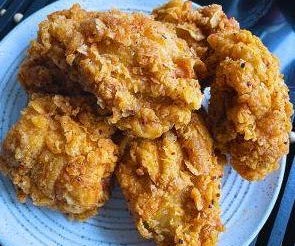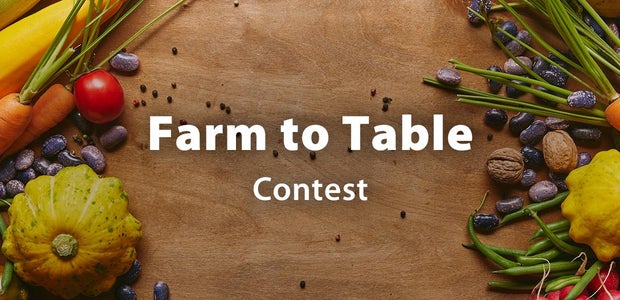Introduction: Vegetarian Mushroom Gravy
Even vegetarians love the mashed potatoes part of Thanksgiving, but what are mashed potatoes without gravy? Through trial and error I've learned to make excellent mushroom gravy for my sister the vegetarian. It's so good that I usually put turkey gravy on the turkey and save my mashed potatoes for the mushroom gravy.
Plus, I have finally learned the secret to avoiding lumpy gravy, and lumpy sauces in general. Fat first!
I first started making mushroom gravy with canida, but she's less vegetarian now, so she's only documented meaty gravy. I decided to fix the lack of vegetarian instructable when my sister called me for tips last weekend.
Plus, I have finally learned the secret to avoiding lumpy gravy, and lumpy sauces in general. Fat first!
I first started making mushroom gravy with canida, but she's less vegetarian now, so she's only documented meaty gravy. I decided to fix the lack of vegetarian instructable when my sister called me for tips last weekend.
Step 1: Ingredients
You'll need a few ingredients:
Critical items:
Critical items:
- onions (at least one)
- mushrooms (portabella or baby bella are best)
- about 4 Tbsp butter (olive oil would probably work, but I've never tried)
- 1/4 cup flour
- 1/2 cup sherry or marsala (other flavored liquids would work, but these have the best flavor here)
- 2 - 4 cups liquid (ideally vegetable broth)
- garlic (as much as you like)
- thyme, dried or fresh
- paprika
- fresh parsley
Step 2: Chopping
Since this is a gravy, I chop the ingredients finely. Minced onions, minced garlic, thinly sliced mushrooms. I almost never chop things finely, but it's worth it. The liquids cook out faster and the gravy is smoother.
Step 3: Sauteing
You can throw your ingredients in, fry 'em up without thinking and have something that works, or you can pay attention, and have something great.
1. Fry the onions in a little butter or olive oil on high to medium high heat. We want really nice brown bits to give the gravy that great roasted taste. Obviously avoid burning them. Onions have quite a bit of liquid inside them, so they can take a pretty high heat, but once they start turning brown, pay more attention and stir more often to minimize the chance of burning.
2. Add the garlic when the onions are close to done. Garlic burns easily on high heat, so this is when you want to turn down the heat to medium or medium low.
3. Add the mushrooms. They'll have a decent amount of liquid in them from the washing, so we want to cook them slowly to draw it out nicely for the sauce. This time I ended up adding one box of mushrooms first, then chopping and adding the second. This led to a nice gradation from totally cooked mushroom bits to fairly solid mushroom slices. If I weren't so lazy I might have cooked them longer, for a smoother gravy, but a few slices are nice too.
4. After the mushrooms have cooked down a little, add the thyme and paprika. I tend to sprinkle, mix, smell or taste, and repeat the process until I'm happy.
I'm horrible at estimating times for these steps, and it's more important to get it to the right doneness than check the time. But the onions might take 10 minutes, the garlic may take 1 minute, and the mushrooms another 10 minutes. But while the mushrooms are cooking, you can start the roux... (And if the mushrooms are done before the roux, you can take them off the heat until you're ready for them, or vice versa.)
1. Fry the onions in a little butter or olive oil on high to medium high heat. We want really nice brown bits to give the gravy that great roasted taste. Obviously avoid burning them. Onions have quite a bit of liquid inside them, so they can take a pretty high heat, but once they start turning brown, pay more attention and stir more often to minimize the chance of burning.
2. Add the garlic when the onions are close to done. Garlic burns easily on high heat, so this is when you want to turn down the heat to medium or medium low.
3. Add the mushrooms. They'll have a decent amount of liquid in them from the washing, so we want to cook them slowly to draw it out nicely for the sauce. This time I ended up adding one box of mushrooms first, then chopping and adding the second. This led to a nice gradation from totally cooked mushroom bits to fairly solid mushroom slices. If I weren't so lazy I might have cooked them longer, for a smoother gravy, but a few slices are nice too.
4. After the mushrooms have cooked down a little, add the thyme and paprika. I tend to sprinkle, mix, smell or taste, and repeat the process until I'm happy.
I'm horrible at estimating times for these steps, and it's more important to get it to the right doneness than check the time. But the onions might take 10 minutes, the garlic may take 1 minute, and the mushrooms another 10 minutes. But while the mushrooms are cooking, you can start the roux... (And if the mushrooms are done before the roux, you can take them off the heat until you're ready for them, or vice versa.)
Step 4: Roux -- the Basis of European Sauciness
I don't know much about classic sauces, but I have learned the key to good gravy: mix the fat with the flour first. Then cook it. Then add the liquid.
So, equal parts fat and flour. For this recipe, about 4 tablespoons of butter and 1/4 cup flour. (Yes, those are equivalent amounts. Silly Imperial system.) Melt the butter in a new pan (everything will end up in this pan at the end, so it should be reasonably big) over medium heat. Mix in the flour. It'll bubble oddly. It looks and smells like Playdoh. Kind of gross, right?
Keep stirring. And stirring. And stirring. You don't want to burn it, but you do want to brown it. So medium heat is good. Lots of stirring. Thick bottomed pans are better here for an even heat.
I can usually tell that my roux is ready from the smell more than the color. It goes from smelling like Playdoh to smelling like baked pie crust. And basically, that's what it is, cooked butter and flour. It just happens to be liquid instead of solid.
So, equal parts fat and flour. For this recipe, about 4 tablespoons of butter and 1/4 cup flour. (Yes, those are equivalent amounts. Silly Imperial system.) Melt the butter in a new pan (everything will end up in this pan at the end, so it should be reasonably big) over medium heat. Mix in the flour. It'll bubble oddly. It looks and smells like Playdoh. Kind of gross, right?
Keep stirring. And stirring. And stirring. You don't want to burn it, but you do want to brown it. So medium heat is good. Lots of stirring. Thick bottomed pans are better here for an even heat.
I can usually tell that my roux is ready from the smell more than the color. It goes from smelling like Playdoh to smelling like baked pie crust. And basically, that's what it is, cooked butter and flour. It just happens to be liquid instead of solid.
Step 5: Deglazing the Mushrooms
Once you've got the roux ready to go, you should deglaze the mushrooms. Deglazing is the point at which you use a liquid to melt those tasty brown bits (fond) off the sides of the pan.
I just sprinkle as much sherry as I need, which is probably between 1/2 and 1/4 of a cup. All of the alcohol cooks off, so we're just doing it for the rich flavors. If you don't have sherry on hand, you could use Marsala wine or vermouth, or red or white wine. I think at one point I used a mix of apple cider vinegar and water, but that was a long time ago.
Once the fond is mixed into the liquid, you're ready to add this to the roux.
I just sprinkle as much sherry as I need, which is probably between 1/2 and 1/4 of a cup. All of the alcohol cooks off, so we're just doing it for the rich flavors. If you don't have sherry on hand, you could use Marsala wine or vermouth, or red or white wine. I think at one point I used a mix of apple cider vinegar and water, but that was a long time ago.
Once the fond is mixed into the liquid, you're ready to add this to the roux.
Step 6: Mixing It All Together
Pour the mushroom bits into the roux. Stir a lot. It'll foam up, but just keep stirring and pouring. The sauce should be thick and glossy. It'll probably be too thick. This is when you add vegetable broth or water to thin it out. If it's really thick, don't just add veggie broth -- it's too salty. Add water too. If you're frugal like my Depression-raised grandmother, you'll add the potato water from your mashed potatoes. Theoretically it has lots of vitamins, and it's already hot.
See how the sides of the pan are nicely coated with thick gravy? Yum.
This is where you could mix in some minced fresh parsley.
See how the sides of the pan are nicely coated with thick gravy? Yum.
This is where you could mix in some minced fresh parsley.









